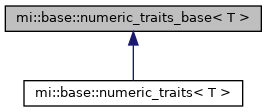Base class for the helper class to deduce properties of numeric types defined in this API. More...
#include <types.h>

Static Public Member Functions | |
| static T() | min () throw () |
Returns the minimum finite value for T (and for floating point types the minimum positive value). More... | |
| static T() | max () throw () |
Returns the maximum finite value for T. More... | |
| static T | negative_max () throw () |
Returns the smallest finite negative value for T. More... | |
| static T | infinity () throw () |
Returns an infinity value for T, if one exists, and T() otherwise. More... | |
| static T | quiet_NaN () throw () |
Returns a quiet NaN value for T, if one exists, and T() otherwise. More... | |
| static T | signaling_NaN () throw () |
Returns a signaling NaN value for T, if one exists, and T() otherwise. More... | |
Static Public Attributes | |
| static const bool | is_specialized = false |
Constant that is true if and only if this traits is specialized for T. More... | |
| static const bool | has_infinity = false |
Constant that is true if and only if T has an infinity representation. More... | |
| static const bool | has_quiet_NaN = false |
Constant that is true if and only if T has a quiet NaN (not-a-number) representation. More... | |
| static const bool | has_signaling_NaN = false |
Constant that is true if and only if T has a signaling NaN (not-a-number) representation. More... | |
Base class for the helper class to deduce properties of numeric types defined in this API.
This class provides the common default implementations of all member of numeric_traits, for its default template as well as all specialization. Thus, specializations just have to redefine what changes.
The default uses default constructed values. It therefore requires that a value of T can be default constructed.